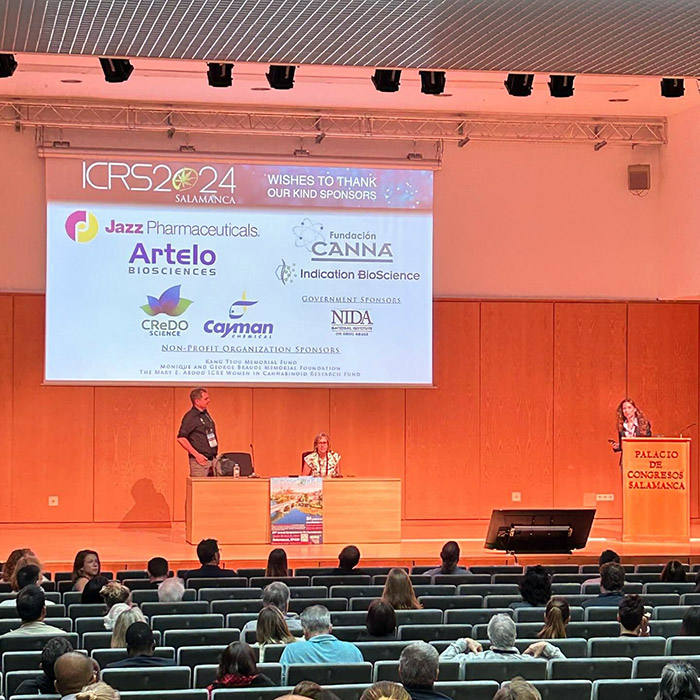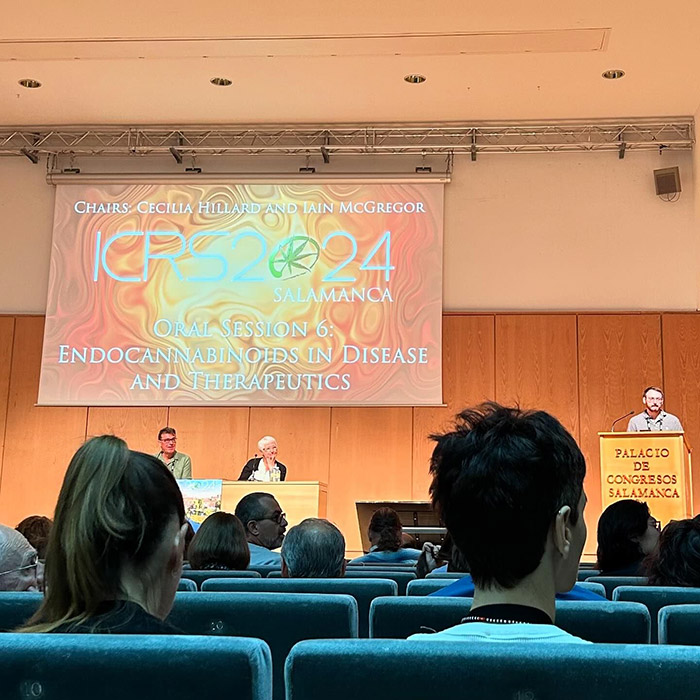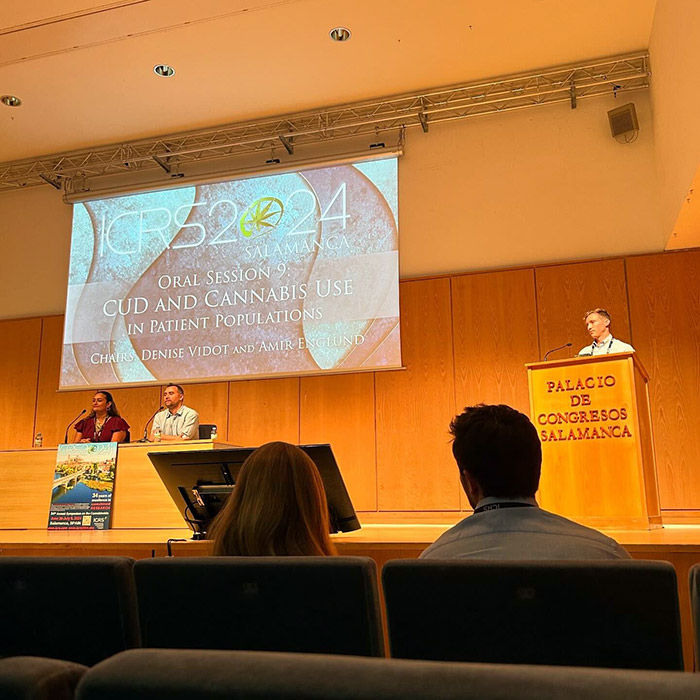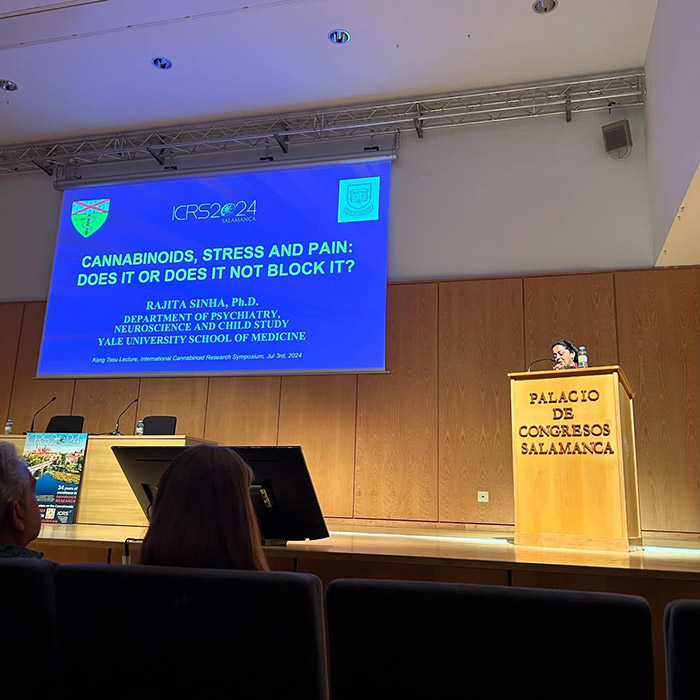The ICRS (International Cannabinoid Research Society) 2024 Symposium gathered top researchers from around the globe in the beautiful and historic university town of Salamanca, Spain, to present the latest findings in cannabinoid science. This year's symposium featured a wide array of topics, including the interactions of cannabinoids with other compounds, their impacts on mammalian development, and their potential therapeutic uses. In this article, we will provide an overview of this year's 2024 ICRS symposium and highlight the excellent work being done by cannabis researchers around the world today.

Day 1: Exploring Drug Interactions and Developmental Impacts
The first day of the symposium opened with a deep dive into how cannabinoids interact with other commonly consumed substances. A very engaging talk was presented by Dr. Justin C. Strickland, who led a detailed investigation into the combined effects of cannabinoids and caffeine. His study, titled "A Double-Blind, Randomized, Placebo-Controlled, Within-Subject Crossover Study of the Effects of Combinations of Cannabinoids and Caffeine," focused on understanding how these two substances interact within the human body.
Caffeine is well-known for its stimulating effects, while cannabinoids can produce relaxation and altered perception. Strickland's research revealed that when combined, these substances might influence each other in unpredictable ways, affecting both mood and cognitive function. This study is particularly relevant as it addresses a common combination in daily life. Many people consume caffeine regularly and may also use cannabis recreationally or medicinally.

Later in the day, Tory Spindle presented research on the effects of combining cannabis edibles with alcohol. His study, "The Impact of Oral Cannabis ('Edibles') Ingestion and Co-use of Alcohol on Acute Driving and Behavioral Impairment, Subjective Drug Effects, and Cannabinoid Pharmacokinetics," explored the safety concerns surrounding this combination, particularly in relation to driving. The study found that the combination of edibles and alcohol can significantly impair driving ability, raising important public safety issues.
As the day progressed, the focus shifted to the developmental impacts of cannabinoids, particularly during pregnancy. Alice Zucchi presented a compelling study titled "Prenatal Overactivation of CB2 Receptor Affects Offspring Germ Cells Development," which highlighted the potential long-term reproductive consequences of prenatal cannabinoid exposure. Zucchi's research emphasized the need for caution during pregnancy, as the effects of cannabis use can extend beyond immediate health concerns to impact future generations.
Samantha L. Baglot's research further explored the developmental impacts of prenatal cannabis exposure. Her study, "An Inhaled Model of Prenatal Cannabis Exposure in Rodents: Effects on Neural-, Immune-, and Endocannabinoid-System Development, and Later-Life Behaviour," used rodent models to assess how cannabis exposure during pregnancy might affect brain development, immune function, and behavior later in life. These findings are crucial for informing public health guidelines as more people use cannabis during pregnancy.
Day 2: Preclinical Innovations and Therapeutic Potential
Day two of the symposium shifted the focus to preclinical research, where scientists shared their latest discoveries on the potential therapeutic uses of cannabinoids. One of the standout presentations was by Marta Gómez-Almería, who explored a new approach to treating amyotrophic lateral sclerosis (ALS), a devastating neurodegenerative disease. Her study, titled "The Effect of FAAH Inactivation in PRP-TDP43A315T Transgenic Mice: Relevance for Possible New Endocannabinoid-Based Therapies in ALS," examined how inhibiting a specific enzyme, FAAH, might slow the progression of ALS in a mouse model.
Gómez-Almería's research is promising, suggesting that manipulating the endocannabinoid system could provide new treatment avenues for ALS. While this research is still in the early stages, it represents an exciting development in the search for effective therapies for this challenging condition.

Another noteworthy presentation on day two came from Antonella Pacini, who introduced a novel compound with dual action potential. Her study, "Unlocking the Therapeutic Potential of the Dual iNOS and Peripheral CB1R Blocker S-MRI-1867 for Preserving Beta Cell Function and Preventing Type 1 Diabetes," focused on a compound that blocks both iNOS and the CB1 receptor. This dual-action approach could help prevent type 1 diabetes by protecting insulin-producing cells in the pancreas.
Type 1 diabetes is a condition that currently has no cure, and preventing its onset would be a significant medical breakthrough. Pacini's research offers a new perspective on how cannabinoids might be harnessed to protect against this autoimmune disease, paving the way for future clinical trials.
Day 3: Clinical Applications and Pain Management
The third day of the symposium was dedicated to clinical research and the practical applications of cannabinoid therapies. Marco Colizzi presented a study that explored the potential of Palmitoylethanolamide (PEA), a naturally occurring compound, in preventing psychosis. His study, "Preliminary Evidence of Palmitoylethanolamide Supplementation in Clinical High-Risk for Psychosis: A 12-Week Open-Label Trial," provided early evidence that PEA might reduce the risk of psychosis in individuals who are considered high risk.
Psychosis is a severe mental health condition that can be challenging to treat, especially in its early stages. Colizzi's research is significant because it suggests a potential new preventive strategy that could improve outcomes for those at risk. If further research supports these findings, PEA supplementation could become a valuable tool in mental health care.

Another impactful study presented on day three was led by Neta Rimmerman, who investigated the use of medical cannabis oil for managing symptoms in dementia patients. Her study, "Part I, Open Label Results of the Safety and Efficacy of Medicane's Medical Cannabis Oil for Treatment of Agitation and Disruptive Behaviors in Subjects with Dementia," focused on whether cannabis oil could help reduce agitation and disruptive behaviors in dementia patients.
Dementia, which affects millions of people worldwide, often leads to challenging behaviors that are difficult to manage with current treatments. Rimmerman's findings suggest that medical cannabis oil could offer a new option for managing these symptoms, potentially improving the quality of life for both patients and caregivers.
The symposium also featured discussions on pain management, a major area of interest in cannabinoid research. Alex Mabou Tagne and his colleagues presented several approaches to using cannabinoids for pain relief. Their research highlighted the effectiveness of cannabinoids in treating different types of pain, including inflammatory and neuropathic pain.
Chronic pain affects millions of people, and traditional painkillers, like opioids, often come with significant side effects and risks of addiction. Tagne's research provided new insights into how cannabinoids might offer a safer alternative, with fewer side effects, for managing chronic pain. These findings are particularly relevant in the context of the ongoing opioid crisis, where finding effective and less addictive pain management options is a priority.
Day 3 concluded with a half-day off in which the attendees explored the historic town of Salamanca together and went paddle-boating to cool off due to the high temperatures.
Day 4: Cannabinoid Pharmacology and Biochemical Signalling
The final day of the symposium was dedicated to endocannabinoid signalling, predominantly in the nervous system. The Presidential Plenary Lecture delivered by Javier Fernández-Ruiz, Ph.D., at 8:30 AM. His talk, titled "The Endocannabinoid System in Brain Aging and Neurodegeneration," provided an in-depth exploration of how the endocannabinoid system plays a crucial role in brain aging and neurodegenerative diseases. Dr. Fernández-Ruiz's lecture highlighted the potential therapeutic implications of targeting this system to manage or mitigate age-related neurological conditions.
Following the plenary lecture, the day continued with Oral Session 10, focused on "Endocannabinoid Mechanism and Signaling". This session featured a series of presentations that delved into the molecular and cellular mechanisms underlying endocannabinoid signaling. One of the key topics discussed was the role of astrocytic FABP5 in the synaptic transport of endocannabinoids, a critical process for maintaining synaptic plasticity and function. Additionally, the session covered the distinct roles of the endocannabinoids 2-AG and anandamide in hippocampal long-term depression, a synaptic process associated with learning and memory. These presentations underscored the complexity and importance of endocannabinoid signaling in the brain, with potential implications for developing new therapeutic strategies for neuropsychiatric and neurodegenerative disorders.

The day concluded with a series of Datablitz and Poster Sessions, where researchers presented quick updates on their latest findings and displayed their work in a more interactive format. The day's events not only provided deep insights into the endocannabinoid system but also fostered lively discussions among researchers, paving the way for future collaborations and advancements in the field of cannabinoid research.
Keynote and Plenary Sessions: Looking to the Future
Throughout the symposium, the keynote and plenary sessions offered a broader perspective on the future of cannabinoid research. One of the highlights was the Presidential Plenary Lecture by Dr. Manuel Guzmán, who discussed the anticancer potential of cannabinoids in his talk titled "Anticancer Activity of Cannabinoids: Past, Present... And Future?"
Dr. Guzmán provided an overview of how cannabinoids have been studied for their ability to fight cancer cells. While laboratory studies have shown that cannabinoids can slow the growth of cancer cells and even induce cell death, translating these findings into effective treatments for humans has proven to be a complex challenge. His lecture emphasized the need for continued research and highlighted the potential of cannabinoids to make a significant impact in cancer treatment in the future.

Conclusion: A Symposium That Expanded the Horizons of Cannabinoid Science
The ICRS 2024 Symposium offered a comprehensive look at the cutting-edge of cannabinoid research. Over four days, researchers presented findings that not only highlighted the therapeutic potential of cannabinoids but also raised important questions about their safety and long-term effects. From exploring drug interactions and developmental impacts to investigating new therapies for conditions like ALS, diabetes, and dementia, the symposium pushed forth our current knowledge of these powerful compounds.
As research continues to evolve, the insights gained from this symposium will undoubtedly shape the future of cannabinoid science. Whether through developing new treatments, improving our understanding of cannabinoid safety, or exploring their broader impacts on health and disease, the work presented at ICRS 2024 will have lasting implications for both science and medicine.


